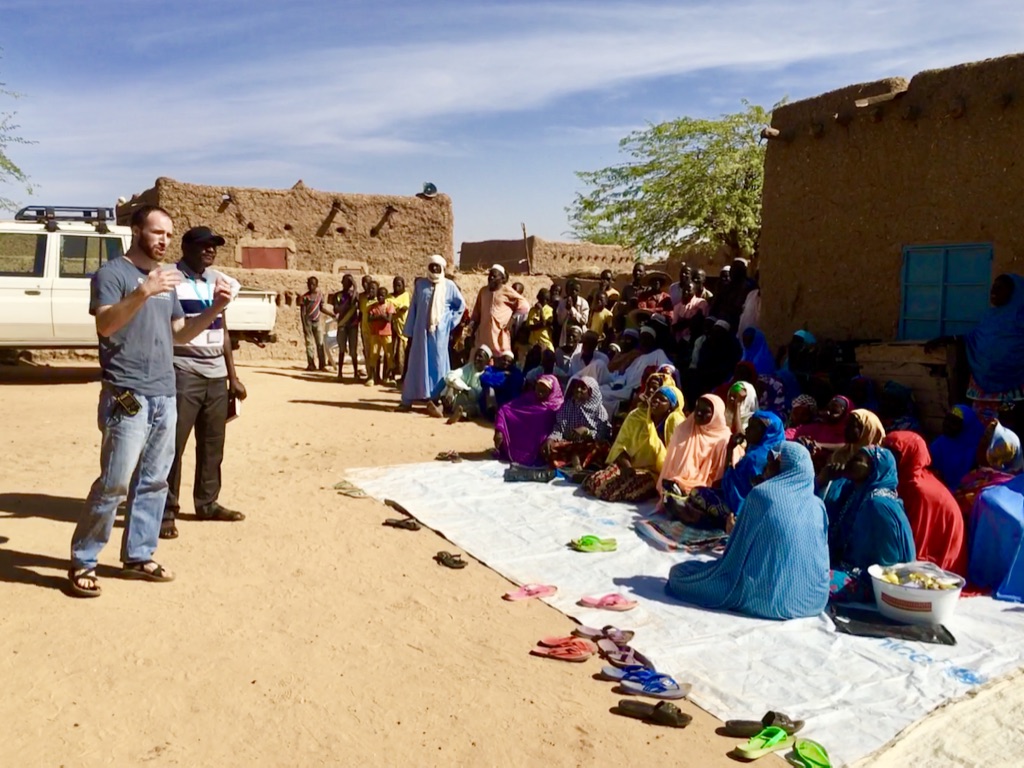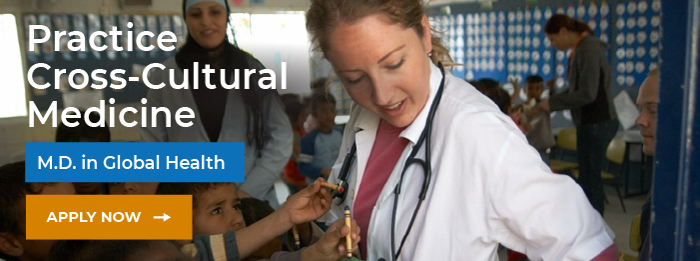Second-year student Bruce Larkin describes the experiences that brought him to study medicine at MSIH and begin training to become a Global Health Doctor. In this photo, he’s seen addressing and encouraging health education volunteers in Niger.
A Story all too Common in Niger
A woman and her husband walk. It is getting late in northwest Niger, and this woman has been experiencing contractions. She needs to see a doctor – urgently. Al-Qaeda has been active in the area, and the military has been instructed to fire at anyone driving a motorcycle. Without any other means of transportation, the couple must walk through 12 miles of desert wasteland to reach the nearest health center. They arrive safely, but only to learn that the clinic’s only nurse is out of town. Desperate, the couple begins to beg for help. One stranger offers to drive them six miles to a maternity ward for 20 dollars – roughly two weeks’ wages. At 2:00 a.m., they arrive at the maternity ward to receive the help they so desperately needed. However, it is far too late, and the mother delivers a stillborn shortly after arriving.
This is the kind of story that is all too common in Niger, a country where there is only one physician per 52,632 individuals.
This is the kind of story that motivates me to become a global health doctor.
Health and Nutrition in Niger
At the time, I was the Health & Nutrition Program Manager for Samaritan’s Purse in Niger. In that role, I was responsible for developing and overseeing projects that creatively increased access to healthcare and improved community health. I was extremely proud of my team. They were working in a very difficult region that was subject to chronic food insecurity, alarmingly high malnutrition rates (a Samaritan’s Purse survey found that 26% of children under the age of two were acutely malnourished), terrorism, and banditry (four American soldiers were killed in a nearby village in October 2017).
Witchdoctors in Place of Neonatal Care
The level of neonatal care available was just as alarming. In 2016, the local health center had only one health center delivery bed for a population of 11,000 adults. As a result, health center staff were delivering babies on plastic tarps outside, and many women were opting to deliver at home or with a witchdoctor.
To sustainably address this problem, my staff held meetings with the village leaders. After explaining the importance of having a maternity ward, they negotiated that if the local men provided bricks and manual labor, Samaritan’s Purse would supply all construction and medical equipment necessary to build a functional maternity ward. Construction was completed within a few weeks, and the Ministry of Health employed a midwife to work at the site.
We Built a Maternity Ward
I was extremely proud and anxious to see the newly constructed maternity ward.

But seeing the parents of the still-born child during my visit was another painful reminder of the seemingly insurmountable barriers that the global poor must overcome to attain the simplest standards of healthcare.
By practicing medicine, I hope to provide primary healthcare where it is lacking, and hence prevent tragedies like this stillborn birth. I also hope to be heavily involved in training local healthcare workers.
It is not difficult to see why I found a school like MSIH appealing. The unique opportunities to deepen my global public health knowledge and see a diverse patient population as a student (Bedouin Arabs, Ethiopian Jews, Russian immigrants, and asylum seekers from various countries all receive treatment at Soroka Hospital) are invaluable in my training as a global doctor.
Improving Healthcare around the World
The public health experiences I had in Niger, the Democratic Republic of Congo, Gabon, and Bangladesh were each foundational in developing my understanding of public health and the social determinants of health. My academic training (Masters of Public Health from the University of Illinois at Chicago, Bachelors of Science from Wheaton College) was similarly foundational in making me well-rounded. However, it is my hope that the unique global health training at MSIH will help me integrate my global health experiences with medical practice so that I can best treat those in need and empower the communities where I will work.
I have been blessed with physical and academic resources. To much is given, much is required. I therefore feel compelled to use my gifts and training to help the least of these and combat medical inequality.



